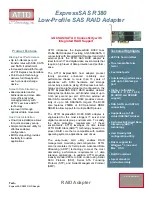
Fabric OS 6.2 administrator guide 193
•
Have a separate zone database for each Admin Domain. See ”
Admin Domains, zones, and zone
databases
” on page 210 for more information.
•
Move devices from one Admin Domain to another without traffic disruption, cable reconnects, or
discontinuity in zone enforcement.
•
Provide strong fault and event isolation between Admin Domains.
•
Have visibility of all physical fabric resources. All switches, E_Ports, and FRUs (including blade
information) are visible.
•
Implement Admin Domains in a fabric with some switches running non-AD-capable firmware versions
(that is, firmware versions earlier than Fabric OS 5.2.0).
•
Continue to run existing third-party management applications. Prior and existing versions of third party
management applications continue to work with admin and user IDs.
IMPORTANT:
The Admin Domain administrator can define up to 254 ADs (AD1 – AD254) in the AD
database; however, HP recommends that no more than 16 active Admin Domains run concurrently. More
than 16 active Admin Domains might cause performance degradation and unpredictable system behavior.
Requirements for Admin Domains
Implementing Admin Domains in a fabric has the following requirements:
•
One or more switches in the fabric must be running Fabric OS 5.2.0 or later.
•
Switches running Fabric OS versions earlier than 6.1.0 must have a valid Advanced Zoning license.
•
The default zone mode setting must be set to
No Access
before you create Admin Domains (see ”
Setting
the default zone mode
” on page 200 for instructions).
•
Virtual Fabrics must be disabled before you create Admin Domains (see ”
Disabling Virtual Fabrics
” on
page 184 for instructions).
•
The fabric must be in the native operating mode. Admin Domains are not supported in interoperability
mode.
•
Gigabit Ethernet (GbE) ports cannot be members of an Admin Domain.
•
Traffic Isolation is supported within Admin Domains, with some restrictions, as described in ”
Admin
Domain considerations for Traffic Isolation Routing
” on page 347.
•
To use Admin Domains and the FC-FC Routing Service in the same fabric, the switches connecting to
the FC router must be running Fabric OS 5.2.0 or later.
•
If the fabric includes LSAN zones:
• The LSAN zone names must not end with “_AD
n
”.
• The LSAN zone names must not be longer than 57 characters.
See Chapter 17 ”
Using the FC-FC routing service
” on page 367, for more information.
Admin Domain access levels
Admin Domains offer a hierarchy of administrative access. To manage Admin Domains, you must be a
physical fabric administrator
. A physical fabric administrator is a user with the admin role and access to all
Admin Domains (AD0 through AD255). Only a physical fabric administrator can perform Admin Domain
configuration and management.
Other administrative access is determined by your defined RBAC role and AD membership. Your RBAC
role determines your access level and permission to perform an operation. Your AD membership
determines the fabric resources that you can operate on.
Summary of Contents for A7533A - Brocade 4Gb SAN Switch Base
Page 1: ...HP StorageWorks Fabric OS 6 2 administrator guide Part number 5697 0016 Edition May 2009 ...
Page 24: ...24 ...
Page 99: ...Fabric OS 6 2 administrator guide 99 ...
Page 100: ...100 Managing user accounts ...
Page 118: ...116 Configuring standard security features ...
Page 164: ...162 Configuring advanced security features ...
Page 234: ...232 Installing and maintaining firmware ...
Page 268: ...266 Administering advanced zoning ...
Page 284: ...282 Configuring Enterprise class platforms ...
Page 292: ...290 Routing traffic ...
Page 294: ...292 Interoperability for merged SANs ...
Page 302: ...300 Configuring the Distributed Management Server ...
Page 334: ...332 iSCSI gateway service ...
Page 340: ...338 Administering NPIV ...
Page 407: ...Fabric OS 6 2 administrator guide 405 ...
Page 408: ...406 Using the FC FC routing service ...
Page 438: ...434 Administering extended fabrics ...
Page 460: ...456 Administering ISL trunking ...
Page 516: ...512 FICON fabrics ...
Page 526: ...522 Configuring and monitoring FICON Extension Services ...
Page 540: ...536 Configuring the PID format ...
Page 544: ...540 Understanding legacy password behavior ...
Page 546: ...542 Mixed fabric configurations for non merge SANs ...
Page 550: ...546 Migrating from an MP Router to a 400 MP Router ...
Page 558: ...554 Inband Management ...
Page 572: ...568 ...















































